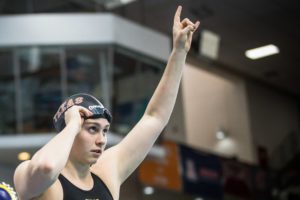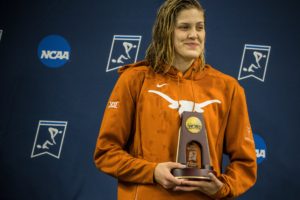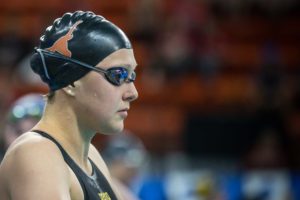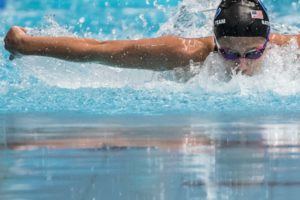We’ll be previewing the top 12 men’s and women’s programs for the 2019-2020 season – stay tuned to our College Swimming Previews channel to catch all 24. Can’t get enough college swimming news? Check out the College Preview issue of SwimSwam Magazine for more in-depth college swimming coverage, including a bird’s-eye view of the flood of coaching changes and our ever-popular rankings of the top 50 individual swimmers in college swimming.
#6 TEXAS LONGHORNS
Key Losses: Joanna Evans (1 NCAA point, 1 NCAA relay), Remedy Rule (2 NCAA relays), Anelise Diener (2 NCAA relays), Quinn Carrozza (1 NCAA relay)
Key Additions: Kelly Pash (IN – multi), Mary Smutny (FL – free/fly), Miranda Heckman (CA – free), Bridget Semenuk (CT – sprint free), Kyla Leibel (Canada – sprint free/fly)
GRADING CRITERIA
We’re unveiling a new, more data-based grading criteria in this year’s series. Our grades this year are based on ‘projected returning points’, a stat of our own making. We started with our already-compiled “no senior returning points” (see here and here), which is effectively a rescoring of 2019 NCAAs with seniors removed and underclassmen moved up to fill those gaps. In addition, we manually filtered out points from known redshirts and swimmers turning pro early, while manually adjusting points for outgoing and incoming transfers and adding in projected points for incoming freshmen with NCAA scoring times, as well as athletes returning from injury or redshirts who are very likely NCAA scorers.
Since we only profile the top 12 teams in this format, our grades are designed with that range in mind. In the grand scheme of college swimming and compared to all other college programs, top 12 NCAA programs would pretty much all grade well across the board. But in the interest of making these previews informative, our grading scale is tough – designed to show the tiers between the good stroke groups, the great ones, and the 2015 Texas fly group types.
- 5 star (★★★★★) – a rare, elite NCAA group projected to score 25+ points per event
- 4 star (★★★★) – a very, very good NCAA group projected to score 15-24 points per event
- 3 star (★★★) – a good NCAA group projected to score 5-14 points per event
- 2 star (★★) – a solid NCAA group projected to score 1-4 points per event
- 1 star (★) – an NCAA group that is projected to score no points per event, though that doesn’t mean it’s without potential scorers – they’ll just need to leapfrog some swimmers ahead of them to do it
We’ll grade each event discipline: sprint free (which we define to include all the relay-distance freestyle events, so 50, 100 and 200), distance free, IM, breaststroke, backstroke, butterfly and diving. Bear in mind that our grades and painstaking scoring formula attempts to take into account all factors, but is still unable to perfectly predict the future. Use these grades as a jumping-off point for discussion, rather than a reason to be angry.
2018-2019 LOOKBACK
The Texas women combined for a fifth-place finish last season at NCAAs. Despite only a handful of individual performances (and the 800 free relay) going season bests at NCAAs, Texas relied on a three-pronged point-scoring formula: score all five relays, bring a couple strong individuals (Evie Pfeifer and Claire Adams combined for 29 points on their own swims), and dominate the diving boards.
Their diving group was led by Murphy Bromberg, the 2019 platform NCAA champ, and between her, Alison Gibson, Sofia Rauzi, and Meghan O’Brien, Longhorn divers racked up a whopping 60 points, nearly a third of Texas’s total points haul. Plus, the Texas free relays were great, with the 400 and 800 relays going 4th and 5th, respectively, and all the other relays scoring, too.
The Texas women were lethal in dual meet season last year. They went undefeated, starting the fall semester by thumping ranked opponents Florida and Indiana in a tri-meet and then rival Texas A&M. Texas’s match-up with Stanford was smoked out by California wildfires, but they were able to swim, and beat, Cal in Berkeley to close out the 2018 dual meet season. On the back half, the Longhorns downed Auburn and Georgia, wiped the floor with Arizona, and overpowered NC State before cruising into championship season.
While the top three was pretty locked down ahead of the rest of the country, Texas could’ve been far more competitive with fourth-place Louisville if they peaked at NCAAs. Most of the team’s season-bests came from mid-season or Big 12’s, including all but the 800 free relay. If the Longhorns are going to move from a top 4-6 team to a top 1-3 team, they will need to be better when it counts.
SPRINT FREE: ★★★
With Grace Ariola, Julia Cook, and Claire Adams all returning, the sprint core of this group is very much intact despite all of the graduation losses. Ariola’s mid-season 21.73 held up as the 11th-best time of the whole season, and she’s on the cusp of getting into 47-second territory in the 100. Only a sophomore, she and Cook (also a sophomore) could continue to develop here. Ariola made the B final in the 50 free at NCAAs but wasn’t able to break 22 seconds, while Cook was top 30 in both sprint free races.

Grace Ariola (photo: Jack Spitser)
The senior Adams was 47.91 in the 100 free B final to place 11th, and with four of eight A finalists last year graduated, she is looking at an upgrade to the A final. Anelise Diener was the fourth relay leg on the sprint relays and graduated, but the Longhorns have five fantastic freestylers incoming.
The 200 free strength is going to be phenomenal in Austin this year. On the 800 free relay last year at NCAAs, Adams and Evie Pfeifer return after splitting 1:43-high’s. Despite losing Joanna Evans and Quinn Carrozza, the freshman class is going to give them a ton of options here. Kelly Pash has been 1:45.25, followed by Mary Smutny (1:45.36), Miranda Heckman (1:46.22), Bridget Semenuk (1:46.93), and Kyla Leibel (1:59.58 LCM). Yep; the entire freshman class will be in competition for this relay, with Pash and Smutny already looking like leading candidates and potential individual scorers with some improvement.
The sprintiest out of the newcomers are Semenuk (22.4/49.1), Pash (22.7/48.5), and the Canadian Leibel (25.4/55.3 LCM). That should keep the relays afloat, at the very least, and Semenuk in the 50 and Pash in the 100 aren’t terribly far out of NCAA scoring range right now (Pash is closer).
DISTANCE FREE: ★★★
Evie Pfeifer is the big returner here with Evans graduated, and she’s a heavy hitter. Pfeifer has made the 500 free A final in both her freshman and sophomore seasons, and she scored in the mile both years, too, at 12th in 2018 and 13th in 2019.

Evie Pfeifer (photo: Jack Spitser)
For scoring options past Pfeifer, the Longhorns might have a couple in the freshman class, but more so in the 500 than the mile. Heckman leads the newcomer group at 4:41.53, with Smutny (4:42.45) and Pash (4:44.78) right there, too. It takes under 4:40 to score at NCAAs these days, but these three will definitely add some spark to the distance group.
As far as the mile goes, most of the freshman class doesn’t have the range up to the mile, though if anyone is going to go for the event as a primary focus, it’s Heckman. Her lifetime best isn’t shabby at 16:28.51, but it’s from 2016 when she was 14.
BACKSTROKE: ★★★
The three main players here are also the aforementioned three top sprint freestylers: senior Claire Adams and sophomores Grace Ariola and Julia Cook. With Carrozza graduated, the speed is really only there in the 100 back.

Julia Cook (photo: Jack Spitser)
Adams dropped a 50.95 in the 100 back at mid-season but was unable to repeat that at NCAAs. Had she done so, she’d have made the A final. Still, she swam to 10th there (51.43, 51.22 in prelims), with Cook also making the B final, clocking a 51.98. Ariola was 52.44 at NCAAs, a half-second out of scoring.
This is another story where the Longhorns could’ve picked up several points more simply by matching their mid-season times. Had they done so, Adams would’ve been in the A final and Ariola would’ve joined Cook in the B.
Regardless, this is a great backstroke group, and their sprint focus is hugely important for the medley relays.
BREASTSTROKE: ★
The breaststroke group isn’t bad– you can’t knock a team with a 59 and a 1:00 returning– but there is really only one person with scoring potential right now: Kennedy Lohman. She was 59.86 mid-season and 59.96 at NCAAs, just a half-second from scoring there. She’s more of a sprint breaststroker, and if Texas is going to score in a breaststroke event, it’ll probably be Lohman in the 100.
Holly Jansen returns after going 1:00.66 at Big 12’s, a lifetime best, and her 2:10.86 in the 200 from 2017 suggests she could come around in the longer event, too. She couldn’t match her high school best last year, though, and Lohman’s 2:12.02 at NCAAs was a season best but only placed 48th. Her 2:09.71 from 2018 is cusp scoring level, though.
BUTTERFLY: ★
With Remedy Rule graduated, Texas loses its medley butterflier and the closest person to scoring for them in either butterfly event last year. She placed 17th in the 100 fly, a tenth out of scoring, and was then DQ’d in the 200 fly despite having shown she can score in the top 8 (as a sophomore she made the A final but was DQ’d in the final).
Lauren Case was 52.0/1:53.4 as a freshman in 2017, taking sixth overall in the 200 fly at NCAAs. She was 17th in prelims of the 200 fly as a sophomore, though, and wasn’t top 30 in either fly event this past season. She’s a senior now with scoring potential depending on her form this season.

Kelly Pash (photo: Mike Lewis)
Adams (52.4) and Ariola (52.6) were decent in the 100 fly last season, and while they likely won’t focus on the event individually, they could be medley relay options.
Freshman Kelly Pash could be very key here. She brings a 52.8/1:57.1 combo in yards, but this past summer dropped big swims at 58.7/2:10.6 in long course. Mary Smutny is strong in the 200 fly, coming in at 1:56.58, though that time is from 2017.
IM: ★★
Evie Pfeifer‘s third NCAA event is the 400 IM, an event in which she scored in the B final as a freshman. She didn’t score as a sophomore, though, but she’s the team’s top IM’er with lifetime bests of 1:56.79/4:05.32. Her 200 IM best came this season at Big 12’s, though as she’s far better (at least in yards) in the 500 free, that’s likely where she’ll stay for day 2 NCAA events, leaving her 400 IM the only real shot for Texas to score in in this discipline.
Nobody else on the roster is that close to scoring level, though freshman Pash (1:58.0/4:10.9) certainly has some potential.
DIVING: ★★★
Losing Murphy Bromberg really hurts, but she actually wasn’t the top diving scorer last season despite being the platform champ. That honor went to Alison Gibson with 28 individual points to lead all scorers on the roster last year at NCAAs, and she returns for one more season.
Meghan O’Brien and Sofia Rauzi, two other divers who scored last year, also graduated. But, Texas could rack up over thirty points from Gibson alone, and sophomore Paola Vazquez is in prime position to move up; she was 17th last year at NCAAs on platform.
RELAYS
Graduation losses most aggressively mess with the Longhorns’ 800 free relay, but that is just the relay that the freshman class is most equipped to re-energize. Bringing back two 1:43 splits is very big, and with two 1:45’s, two 1:46’s, and a long course 1:59 incoming with this freshman class, Texas could quite honestly improve upon their time of 6:55.80 last year. Pash and Smutny are about a half-second or so away from Quinn Carrozza‘s 1:44.7 lead-off leg from NCAAs last year, and with a relay start and a year of improvement, it’s well within the realm of possibility that one of the other freshmen could come in and split 1:45 or better to try to replace Evans’ 1:43.2 anchor leg.
Even at face value, Texas only loses two or so seconds on the relay, which would’ve still scored top 10 at 2019 NCAAs.
The sprint free relays are in even better shape, with three legs returning. Depending on how they fare in their debut collegiate seasons, the fourth leg on the 200 and 400 free relay will likely be some combination of Semenuk, Pash, or Leibel. Diener was 22.3/48.2 flat start as a senior, which are just a hair ahead of the Semenuk (22.4) and Pash (48.5), and Leibel is somewhere around there, too, at 25.4/55.3 in LCM, which is nearly identical to Diener’s long course bests of 25.3/55.6.
The medleys will need to get clever to replace Rule’s fly leg, but Ariola and Adams are very capable of swimming back/fly/free and Cook can do back or free, while Pash might be called up for fly or Leibel (26.9/1:00.7 in LCM).
2019-2020 OUTLOOK
Texas might have lost a ton of mid-distance firepower, but they reloaded with five strong freestylers who specialize at different points of the distance spectrum: two are pure sprinters, two are more mid-distance, and one can really extend to the mile. They’re all fabulous at the 200 free.
Most of their strengths from last year– diving, mid-distance free, sprint back/free– are still very much so intact, and Gibson, Pfeifer, and Adams will be expected to haul in big individual numbers. What Texas needs to do is figure out how to nail their peak at NCAAs; otherwise, they risk leaving points on the board and staying outside the top tier of the NCAAs for another season despite a ton of raw talent on their roster.

I heard Lohman broke her jaw & will be out of the water for awhile
It’s amazing the love that Texas gets from this forum…how is it that every year they boast about what this team can accomplish but it never happens? Makes you wonder…I don’t these see these rose- colored glasses for other teams.
Now we have a pro-Texas bias??? Ugh I just can’t keep up. Don’t worry, by the time the men’s rankings are done, that will be back to an anti-Texas bias ;-).
Amazing that Joanna Evans, Remedy Rule and Quinn Carrozza scored…..one….individual point at NCAAs….
Carol one of the truly great people in our sport. Best wishes for a great year
carol needs to focus on NCAAs – she is a great coach (coached pfeifer to 2nd in 400IM at WUGS), no doubt about that. But with a college team, especially being in the Big 12 where they dont need to rest for conference.
Carol and Eddie should switch spots for one year. That would be interesting.
every year, everybody has high hopes for the texas women – and they don’t perform to what they should. They need to focus on NCAAs
Wait till they preview USC
I believe they’ve previewed USC already at #10
Is this the year they finally stop caring about dual meet results? 🤔
Stealing a page out of the UGA book; 200 free swimmers can score lots of points and make lots of relays pretty good. Way to go Carol, steal the best ideas from Jack !!
They dont do homework either??
Yeah since he was the first coach to try to have good 200 free swimmers scoring points!!!!
Seems like Eddie Reese has been using this formula for a while, too.
coaching is stealing ideas that work from somebody else and it is all circular, everything old is new again.
As we were building the SMU women’s program in the late 80’s / early 90’s and landed a few good 200 freestylers, Jim Montgomery commented to me something along the line that Doc always felt the 200 freestyler was the “backbone of an NCAA team”.
I’m sure someone predated Doc as well.